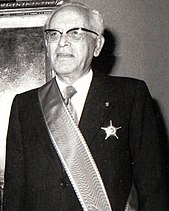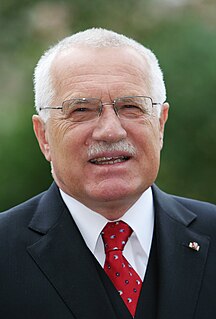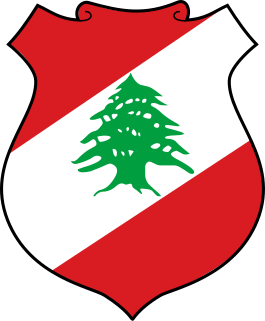
The President of the Czech Republic is the elected formal head of state of the Czech Republic and the commander-in-chief of the Military of the Czech Republic. Unlike counterparts in other Central European countries such as Austria and Hungary, who are generally considered figureheads, the Czech president has a considerable role in political affairs. Because many powers can only be exercised with the signatures of both the President and the Prime Minister of the Czech Republic, responsibility over some political issues is effectively shared between the two offices.

René Moawad as 13th President of Lebanon for 17 days in 1989, from the 5 to 22 November, when he was assassinated by unknown assailants.
Élias Youssef Sarkis was a lawyer and President of Lebanon, who served from 1976 to 1982.

Suleiman Kabalan Frangieh, last name also spelled Frangié,Franjieh, or Franjiyeh, was a Lebanese Maronite politician, President of Lebanon from 1970 to 1976.

Raymond Émile Eddé was a Lebanese Maronite statesman who served his country for many years as a legislator and cabinet minister. He led the Lebanese National Bloc, an influential political party. The son of former President Émile Eddé, Raymond Eddé was himself a candidate for the presidency in 1958, and was proposed for the post on numerous subsequent occasions. He is remembered for having held consistent views, which he refused to compromise for the sake of political gain. His supporters called him "Lebanon's Conscience." He was a strong nationalist, who opposed the French Mandate, and later, Syrian, Israeli, and Palestinian military intervention in Lebanon.

Suleiman Tony Frangieh is the current leader of the Marada Movement and a Member of Parliament for the Maronite seat of Zgharta-Zawyie, in North Lebanon.
An indirect presidential election was held in the Parliament of Lebanon on 25 May 2008, after the term of incumbent President Émile Lahoud expired on 24 November 2007 at midnight. General Michel Sleiman, the Commander of the Lebanese Armed Forces, was elected as the consensus candidate after months of delays in holding the election due to an ongoing political dispute.

The 1999 election of the President of the Italian Republic was held on May 13, 1999. As a second-level, indirect election, only Members of Parliament and regional deputies were entitled to vote. Carlo Azeglio Ciampi was elected head of state of the Italian Republic, a role of representation of national unity and guarantee that Italian politics comply with the Constitution, in the framework of a parliamentary system.

Indirect presidential elections were held in the Czech Republic in January and February 2003 to elect a new President. The Parliament of the Czech Republic failed to elect a candidate on the first two ballots on the 15 and 24 January. However, on the third round of the third ballot on 28 February, Václav Klaus was elected.

The 1985 election of the President of the Italian Republic was held on June 24, 1985. As a second-level, indirect election, only Members of Parliament and regional deputies were entitled to vote. Francesco Cossiga was elected head of state of the Italian Republic, a role of representation of national unity and guarantee that Italian politics comply with the Constitution, in the framework of a parliamentary system.

A series of rounds in the Lebanese presidential election were held from 23 April 2014 until 31 October 2016. No candidate reached a two-thirds majority vote in the first round, and subsequent rounds failed to gain a quorum. Finally in the forty-sixth round held on 31 October 2016, Michel Aoun, a Member of Parliament and formerly a disputed Prime Minister and Acting President in a rival government near the end of the Lebanese Civil War, was elected with 83 votes in Parliament. He took office the same day as the 12th President of Lebanon since independence in 1943.

The Italian presidential election of 2015 was held on 29–31 January, following the resignation of incumbent President Giorgio Napolitano on 14 January 2015. The office was held at the time of the election by Senate President Pietro Grasso in an acting capacity. Only members of Italian Parliament and regional delegates are entitled to vote. As head of state of the Italian Republic, the President has a role of representation of national unity and guarantees that Italian politics comply with the Italian Constitution, in the framework of a parliamentary system.
An indirect presidential election was held in the Parliament of Lebanon on 24 November 1998, resulting in General Emile Lahoud being elected President of the Lebanese Republic.

The Council of Ministers of Lebanon is the executive body of the Republic of Lebanon. Its president is the Prime Minister of Lebanon, and it appointed by the President of Lebanon with confirmation of the Parliament of Lebanon. It is generally equally composed of Muslims and Christians. The Council of Ministers is considered to be the "government" of Lebanon by the Constitution.

An indirect presidential election was held in the Parliament of Lebanon on 24 November 1989, resulting in Deputy Elias Hrawi being elected President of the Lebanese Republic.
An indirect presidential election was held in the Parliament of Lebanon on 5 November 1998, resulting in Deputy René Moawad being elected President of the Lebanese Republic.




















